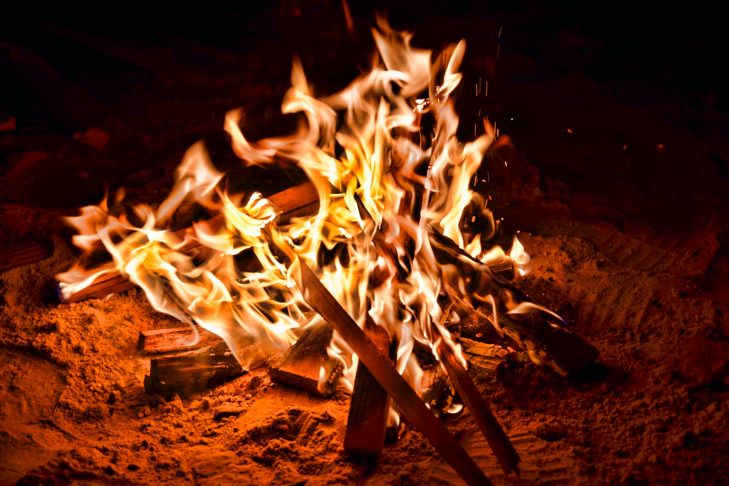For many, Tisha b’Av is an arrow pointing towards the start of the cycle of teshuvah, that leads us through Elul and into Tishrei. The themes, questions, and prayers of this holiday can lead us to find meaning and connection in the season of returning.
This year on Tisha b’Av, as I sat around a fire, I found myself praying for the children. It began with “I’m sorry.”
And it continued, “I’m sorry for the world you are inheriting, and even more for the earth you are inheriting.”
I’m sorry you have to ask “is there lead in this soil?“ when a perfect heirloom tomato sits in front of them. I’m sorry that the air is toxic on these hot afternoons, making your eyes burn in your lungs ache. I’m sorry for all the days you can’t swim this summer, because the waters are filled with the overflow of sewers.
The next day, in the haze of a difficult fast, I walked through the forest, asking questions of the trees. On the path before me, a bird burst out of the leaves. I scared them, and they scared me. When I approached, I saw that they were unwell, maybe hurt or maybe sick.
I sat with that bird as their chest heaved up and down, the look of pleading and panic in their eyes. I thought to myself, I can’t stop their suffering. I can only sit here with them and accompany them. I can breathe with them and sing to them.
So then we sat. I started to sing, they continued to breathe, we both closed our eyes.
Soon after, I returned from my walk in the forest with a clear call to witness suffering. To come close to suffering. To sit with suffering.
If I walk around with my head in the clouds, shouting to the heavens about climate chaos, displacement of humans and our kin, the end of species, the degradation of ecosystems, the theft of land and the pollution of waterways, I miss out on my chance to love. Love both as a feeling and an action.
Climate action for me most often takes the shape of teaching children to love the world, to deepen their relationship with the earth they will inevitably have to fight for.
I spent much of this summer teaching children to notice. To step outside of the story of the world, and into an experience of it—less mind, more body, placing their senses and questions at the center of their awareness.
And that’s the call that I carry forth: to remember to smell, touch, taste, hear, and see the world around us, to grieve with it as it changes and to remember joy and pleasure I have a place in our relationship. To not lose connection, even as so much is lost.
The call is to teach our children to befriend the plants and animals, to notice when they’re hurting and to not look away from suffering, to witness life and death with compassion, to witness change and loss with presence, and to look to the east, and remember that even amongst all this, the sun will rise again tomorrow.
Rebecca Heisler is a student at The Rabbinical School of Hebrew College in Newton and the Director of Y’ladim BaTeva at Ma’yan Tikvah. She has worked at Wilderness Torah as a B’naiture Mentor and Youth Programs Manager, a Youth Mentor, Backpacking Trip Leader & JOFEE Fellow. She has taught Hebrew school, worked at Urban Adama in Berkeley, CA, and been a community organizer for Jews on Ohlone Land in Berkeley. She is a place-based Jewish educator and brings gentleness, compassion, liberatory frameworks, creative curriculum, and a laugh that fills a room. Becca is steadfast and wholehearted in her commitment to care, joy, curiosity, storytelling, and song.
This post has been contributed by a third party. The opinions, facts and any media content are presented solely by the author, and JewishBoston assumes no responsibility for them. Want to add your voice to the conversation? Publish your own post here. MORE


